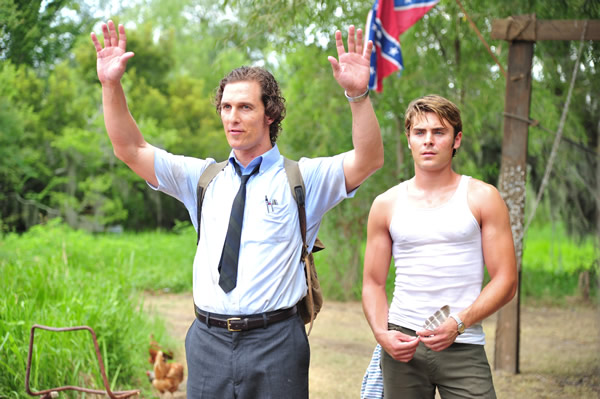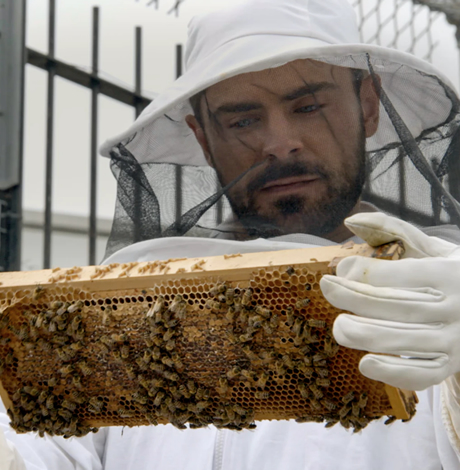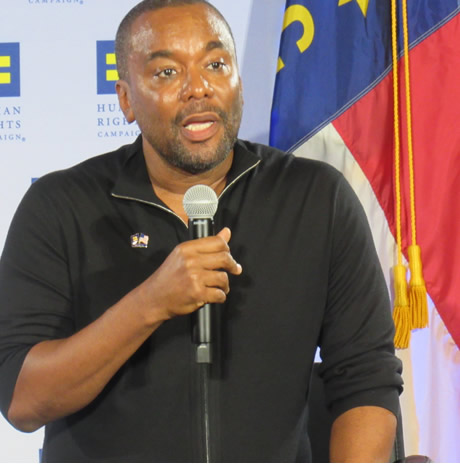Arts & Entertainment
Summer of ‘69
Gay-helmed ‘Paperboy’ fails to gel despite strong cast


Matthew McConaughey and Zac Efron in new film ‘The Paperboy.’ The sordid tale opens today in the D.C. area. (Photo courtesy of the Karpel Group)
“The Paperboy” has an impressive pedigree.
It’s directed by Lee Daniels, the openly gay director who made a striking debut with “Precious.” It’s based on an award-winning novel by Pete Dexter. It stars Matthew McConaughey, Zac Efron, Macy Gray, Nicole Kidman and John Cusack. But unfortunately, despite this great promise and a strong start, this steamy tale of sex and violence, which opens today at Landmark E Street Cinemas in the D.C. area and at the Angelika Mosaic in Fairfax, Va., loses steam partway through.
Set in 1969, “The Paperboy” tells the story of two brothers who return to their hometown in rural northern Florida. Zac Efron plays Jack Jensen, a collegiate swimmer who has been kicked off the team and expelled from college. His father, the staunchly traditional publisher of the local paper (a great performance by a gruff Scott Glenn), puts him to work as a paperboy. Matthew McConaughey plays Ward Jensen, a hot-shot reporter for a Miami newspaper who returns home with his ambitious writing partner Yardley Acheman (David Oyelowo) to investigate a claim of wrongful imprisonment.
The convict in question is Hillary Van Wetter (John Cusack) who has been jailed for killing an abusive sheriff. Pleading his case is the sultry Charlotte Bless (Nicole Kidman), a death row groupie who has become engaged to Van Wetter even though they have never met. She has assembled boxes of evidence calling the prosecution’s case into question. Smelling a juicy story, the newsmen pursue leads through the squalid swamp shacks of Van Wetter’s relatives and the equally sordid offices of corrupt lawyers and law men.
The movie is well steeped in the traditions of the Southern Gothic: lies, sexual tension, racism, politics, hypocrisy, psychosis, hidden secrets, brutal violence and twisted family histories. The plot, of course, is full of twists and turns, including an unexpected revelation about a character’s sexual orientation and unorthodox sexual tastes. The film vividly recreates the look and feel of lurid period potboilers. Cinematographer Roberto Schaefer uses an intense saturated color palette to perfectly capture the stifling settings and sweltering temperatures. Composer Mario Grigorov effectively combines period music with original compositions to capture the shifting moods and alliances.
The cast throw themselves into the tawdry characters with admirable conviction. Zac Efron proves that he has made the transition from Disney star to Hollywood actor (although his fans will be pleased to know that he spends much of the movie shirtless and is frequently seen in his underwear). He displays Jack’s intense loyalties, inchoate anger, smoldering lust and casual cruelties with admirable restraint, especially given the emotional excesses of the story. John Cusack is chilling as the convicted killer who may be much cannier than he looks.
Nicole Kidman radiates sexual energy and an aching need as the vampy Charlotte, a siren who gets caught in her own snare. She looks great in the period styles and brings surprising depth to what could be a one-dimensional character. Her fearless performance includes some of the film’s already infamous scenes: dancing in the rain with Efron, applying the traditional cure for a jellyfish sting to him and bringing Cusack to a jailhouse orgasm from the other side of the room.
Macy Gray is somewhat less successful as Anita Chester, the Jensen family maid, but the fault lies with the direction and writing. The thankless role never quite escapes the well-worn Hollywood shorthand of the maternal black maid. Further, Anita awkwardly and unnecessarily serves as the movie’s narrator, telling the story from a confusing variety of perspectives. At one point, she is being interviewed by a journalist; at other times, she simply adds colorful commentary to the action; at other times, she controls the action of the movie, telling the audience, for example, that they don’t need to see any more of an unfolding sex scene as the camera cuts away.
The unsteady pacing, uncertain direction and uneven writing (the screenplay is by Daniels and Dexter) sadly rob the film of much of its potential impact. Fans of the genre and fans of the talented cast will be amply rewarded, but this is definitely not a film for all audiences.

Team DC, the umbrella organization for LGBTQ-friendly sports teams and leagues in the D.C. area, held its annual Night of Champions Awards Gala on Saturday, April 20 at the Hilton National Mall. The organization gave out scholarships to area LGBTQ student athletes as well as awards to the Different Drummers, Kelly Laczko of Duplex Diner, Stacy Smith of the Edmund Burke School, Bryan Frank of Triout, JC Adams of DCG Basketball and the DC Gay Flag Football League.
(Washington Blade photos by Michael Key)




















The 2024 National Cannabis Festival was held at the Fields at RFK Stadium on April 19-20.
(Washington Blade photos by Michael Key)
















Covering the @NatlCannaFest at RFK Stadium for @WashBlade . Stop by the LGBTQ+ booth and pick up a paper if you are here. pic.twitter.com/is7hnsaPns
— Michael Patrick Key (@MichaelKeyWB) April 20, 2024
Theater
‘Amm(i)gone’ explores family, queerness, and faith
A ‘fully autobiographical’ work from out artist Adil Mansoor

‘Amm(i)gone’
Thorough May 12
Woolly Mammoth Theatre
641 D St., N.W.
$60-$70
Woollymammoth.net
“Fully and utterly autobiographical.” That’s how Adil Mansoor describes “Amm(i)gone,” his one-man work currently playing at Woolly Mammoth Theatre.
Both created and performed by out artist Mansoor, it’s his story about inviting his Pakistani mother to translate Sophocles’s Greek tragedy “Antigone” into Urdu. Throughout the journey, there’s an exploration of family, queerness, and faith,as well as references to teachings from the Quran, and audio conversations with his Muslim mother.
Mansoor, 38, grew up in the suburbs of Chicago and is now based in Pittsburgh where he’s a busy theater maker. He’s also the founding member of Pittsburgh’s Hatch Arts Collective and the former artistic director of Dreams of Hope, an LGBTQ youth arts organization.
WASHINGTON BLADE: What spurred you to create “Amm(i)gone”?
ADIL MANSOOR: I was reading a translation of “Antigone” a few years back and found myself emotionally overwhelmed. A Theban princess buries her brother knowing it will cost her, her own life. It’s about a person for whom all aspirations are in the afterlife. And what does that do to the living when all of your hopes and dreams have to be reserved for the afterlife?
I found grant funding to pay my mom to do the translation. I wanted to engage in learning. I wanted to share theater but especially this ancient tragedy. My mother appreciated the characters were struggling between loving one another and their beliefs.
BLADE: Are you more director than actor?
MANSOOR: I’m primarily a director with an MFA in directing from Carnegie Mellon. I wrote, directed, and performed in this show, and had been working on it for four years. I’ve done different versions including Zoom. Woolly’s is a new production with the same team who’ve been involved since the beginning.
I love solo performance. I’ve produced and now teach solo performance and believe in its power. And I definitely lean toward “performance” and I haven’t “acted” since I was in college. I feel good on stage. I was a tour guide and do a lot of public speaking. I enjoy the attention.
BLADE: Describe your mom.
MANSOOR: My mom is a wonderfully devout Muslim, single mother, social worker who discovered my queerness on Google. And she prays for me.
She and I are similar, the way we look at things, the way we laugh. But different too. And those are among the questions I ask in this show. Our relationship is both beautiful and complicated.
BLADE: So, you weren’t exactly hiding your sexuality?
MANSOOR: In my mid-20s, I took time to talk with friends about our being queer with relation to our careers. My sexuality is essential to the work. As the artistic director at Dreams of Hope, part of the work was to model what it means to be public. If I’m in a room with queer and trans teenagers, part of what I’m doing is modeling queer adulthood. The way they see me in the world is part of what I’m putting out there. And I want that to be expansive and full.
So much of my work involves fundraising and being a face in schools. Being out is about making safe space for queer young folks.
BLADE: Have you encountered much Islamophobia?
MANSOOR: When 9/11 happened, I was a sophomore in high school, so yes. I faced a lot then and now. I’ve been egged on the street in the last four months. I see it in the classroom. It shows up in all sorts of ways.
BLADE: What prompted you to lead your creative life in Pittsburgh?
MANSOOR: I’ve been here for 14 years. I breathe with ease in Pittsburgh. The hills and the valleys and the rust of the city do something to me. It’s beautiful, it’ affordable, and there is support for local artists. There’s a lot of opportunity.
Still, the plan was to move to New York in September of 2020 but that was cancelled. Then the pandemic showed me that I could live in Pittsburgh and still have a nationally viable career.
BLADE: What are you trying to achieve with “Amm(i)gone”?
MANSOOR: What I’m sharing in the show is so very specific but I hear people from other backgrounds say I totally see my mom in that. My partner is Catholic and we share so much in relation to this.
I hope the work is embracing the fullness of queerness and how means so many things. And I hope the show makes audiences want to call their parents or squeeze their partners.
-

 South America3 days ago
South America3 days agoDaniel Zamudio murderer’s parole request denied
-

 Maryland4 days ago
Maryland4 days agoMontgomery County police chief discusses arrest of trans student charged with planned school shooting
-

 Politics5 days ago
Politics5 days agoCourt records raise concerns about right-wing TikTok investor’s influence
-

 Commentary4 days ago
Commentary4 days agoWorld ‘isn’t much different today’









